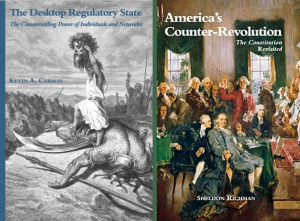[cross-posted at BHL]
It’s often said – particularly on holidays like Veterans Day and Memorial Day – that Americans owe their freedom (such as it is) to u.s. military veterans.

This claim has always puzzled me. In what war in living memory was the freedom of Americans at stake? Without u.s. military action, were Japanese or German troops – let alone Italian, Vietnamese, Korean, Panamanian, Afghani, or Iraqi ones – really going to be marching though Times Square? If anything, given the notorious ratchet effect whereby wars tend to produce permanent increases in government power, it seems more probable that u.s. military action has contributed to a diminution of our freedom.
Yet Americans do enjoy a greater degree of liberty, however inadequate, than citizens of many other countries around the world. To whom do we owe that fact?
Many people wear shirts that say, “If you love freedom, thank a veteran.” I wear a shirt that says “If you love freedom, thank an anarchist.”
So what have anarchists (and other fractious dissidents) done for the cause of freedom? In answer, I quote from two recent articles:
Anarchists have never taken power. We have resisted authoritarianism and oppression in every arena. From calling out Marxism long before its draconian aspirations became public record, to fighting and dying to resist Fascism, fighting Franco until he couldn’t afford to join Hitler and Mussolini and leading the resistance against the Nazis across Europe. We’ve fought the robber barons, the czars, the oligarchs, and the soviet bureaucrats.
And we’ve been extraordinarily popular in different regions at different points in history, although we have not yet had sufficient critical mass to completely transform the world. In every instance where anarchism surged to localized popularity with a few million adherents, as in Spain but also Ukraine and Manchuria, every surrounding power immediately put their wars on hold to collaborate in snuffing out the examples we provided of a better world, of better ways of interacting and settling disputes with one another, that do not turn to control but build a tolerable consensus for all parties when agreement is needed.
We’ve been at the forefront not just of technology like cryptocurrencies and the tor project, but we’ve also been at the forefront of struggles against patriarchy, racism, homophobia, ageism, ableism, etc., etc. Since long before there were popular coalitions like “feminism.” We smuggled guns to slaves and ran abolitionist journals. We’ve coursed through the veins of our existing society, pioneering myriad social technologies like credit unions and cooperatives. We’ve consistently served as the radical edge of the world’s conscience, and played a critical role in expanding what is possible while developing and field testing new insights and tools.
Anarchism – as many commentators have noted – has served as the laboratory of the left, of social justice and resistance movements around the world. Even where we remain marginal, the tools we invent eventually become mainstream.
— William Gillis, “Transhumanism Implies Anarchism”
[The] claim that our rights are something “given to” us, handed down from above by the government and its soldiers, is a pernicious, authoritarian, damned lie.
Who has given us our rights? Nobody. We have taken them. Every right we have, we have because we fought for it from below. We have these rights because we resisted violations of them, because we fought those who violated them – sometimes fighting “the Soldier” – and compelled the state to recognize them. And the state recognizes them because it’s afraid that if it violates them we’ll damn well fight it – and its soldiers – again.
Rights have never been granted by authority. They have always been asserted against authority, and won from it. We don’t have our rights because the government and its soldiers are nice – but because we’re not. It’s not the Soldier – it’s the dissidents, the hell-raisers, the dirty flag-burning hippies, the folks with bad attitudes towards authority in general, who have given us our rights throughout history, by fighting for them.
— Kevin A. Carson, “No, It’s Not ‘The Soldier’”




